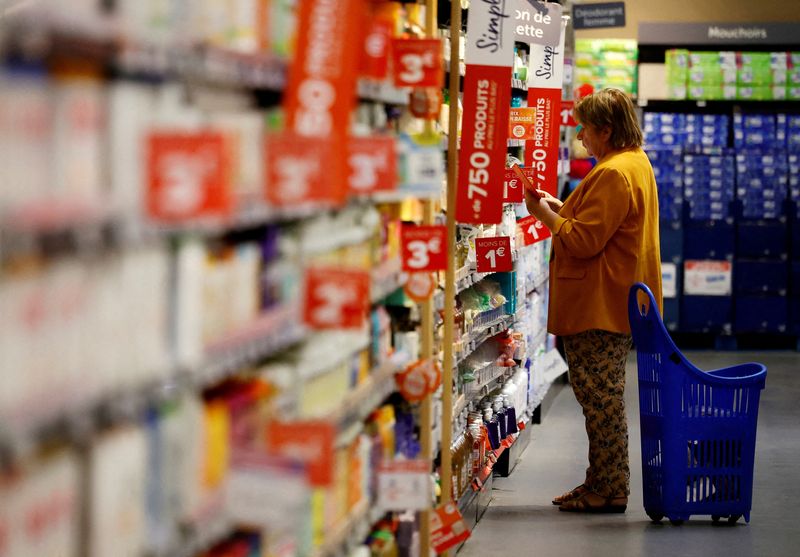By Francesco Canepa and Maria Martinez
FRANKFURT (Reuters) -Inflation in the euro zone fell to its lowest level in two years in September, suggesting the European Central Bank's steady diet of interest rate hikes was succeeding in curbing runaway prices albeit at a growing cost for economic growth.
Consumer prices in the 20 countries that share the euro rose by 4.3% in September, the slowest pace since October 2021, from 5.2% one month earlier, according to Eurostat's flash reading published on Friday.
Inflation excluding food, energy, alcohol and tobacco -- which is closely watched by the ECB as a better gauge of the underlying trend -- fell to 4.5% from 5.3%, the biggest drop since August 2020.
These readings were likely to strengthen the ECB's conviction that it had raised interest rates far enough to bring down inflation to its 2% target by 2025, after being wrong-footed by a surge that started in 2021.
"Base effects played a key role in explaining the sharp fall in inflation, but the figures also suggest that underlying inflationary pressures are becoming less intense," Diego Iscaro, head of European economics at S&P Global Market Intelligence, said.
"The figures reinforce the view that interest rates have likely reached their peak in the current tightening cycle."
The inflation drop was broad-based, with all price categories growing at a slower pace and energy prices falling outright for a fifth consecutive month.
A separate report showed German import prices -- which tend to lead consumer prices because Germany sources many intermediate products and raw materials from abroad -- recorded in August the largest year-on-year decline since November 1986.
RECESSION?
Euro zone inflation briefly hit double digit last autumn amid a combination of soaring energy costs, post-pandemic snags in supply chains and high government spending.
In response, the ECB lifted its key interest rate to a record-high of 4.0% from a trough of minus 0.5% in just over a year, turning off the money taps after a decade spent trying to stimulate inflation via an ultra-easy monetary policy.
But the effect on the economy of the steepest tightening cycle in the ECB's near 25-year history was becoming increasingly apparent, with some indicators pointing to a possible recession in the euro zone.
German retail sales fell in August and unemployment rose in September, data showed earlier on Friday, confirming the euro zone's biggest economy may be heading for its second recession this year.
So far, the ECB is sticking to its expectations of an economic rebound next year, partly thanks to higher real wages as inflation falls.

But that outlook was predicated on the external environment -- including in China, where the economy is slowing -- not deteriorating much further and investment remaining resilient, according to Natixis economist Dirk Schumacher.
"The rise in interest rates has been much quicker than in previous times so looking to the past as a model may mislead," Schumacher added.